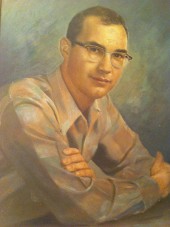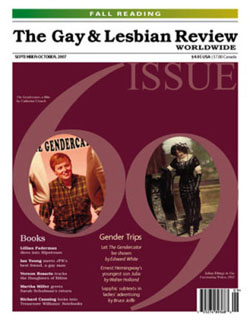Aug. 23, 2007.
Dear Richard Schneider:
I spent a great evening reading the current (Sept/Oct) issue of GLR and of course liked it very much.
I admit I read reviews and watch them on C-SPAN more than I read books, but there are a few I learn about that I do seek to read. I will skip over the articles; I am not interested in Tennessee Williams, or Trans issues, but I did find Walter Williams’ article on the Buddhist conference good, and the discussion of ads in old ladies magazines, and agree with Edward White’s thoughts on the P.C. gays censoring the Gendercator thing. I liked very much the thoughts in the review of what I consider a very important “issue/book” David Pitts/ Jack & Lem. The review by Ian Young is good, but it for the first time made me wonder something — we keep talking about how the Kennedy family thought of the relationship, but what did the Billings family think????
The review of Marcia Gallo’s book, Different Daughters, by Vernon Rosario is excellent — it does a good objective job but shows insight that many people would not have had. I would like to have his thoughts on the Sears book on Hal Call/Mattachine. I would hope he would be equally as objective when he/if he sees the C. Todd White book, Pre-Gay L.A., covering the other of the three major early homosexual organizations/publications.I have not seen the book on Jack Nichols, but the thoughts on it by Burr sound right and may be generic to most of our movement/cause’s pioneers, as is seen in the Gallo book and Sears book.
I can’t remember where in the issue, but something said reminded me of a distinction that W. Dorr Legg seems to have made that we ignored too long before the division of ONE. He made a point about a question of why ONE was not worried about the government trying to get our mailing list — and I even now can’t understand why he thought this way — but he said some organization’s mailing list may be vulnerable, but ours was a publication list and was protected. I wonder if Eric (Julber) had said this or why he thought it; there had been an attempt by the government, I think, to get a list of members of some group — maybe the NAACP. But this sure made his later arguments about the priorities of ONE strange since he by this thinking said we were mainly a magazine, which of course we started out as (there was only the magazine at first). But reviewers of our history will not see all these perhaps small but relevant issues that did cause internal differences, even among even good people.
I might also point out, since I’m reading back issues of ONE and Tangents for another reason, that it seems to me that we got it right all those 40 or so years ago, and that is that the parts of ONE most people thought were the most important, were not, and the “news” and letters to the editor, and even the ads, now in 2007 seem to me to be of more importance to those seeking to learn how life was in the ’50s to ’70s when we published.
And finally I am encouraged by all the events listed on your “Bulletin Board.” You and your co-workers are doing a great service for our community and for non-homosexuals who seek to understand the issues and our community.



